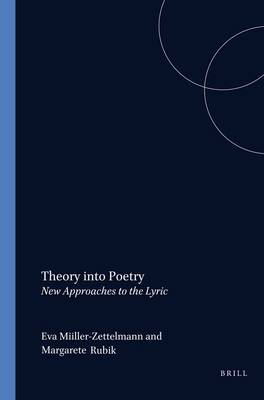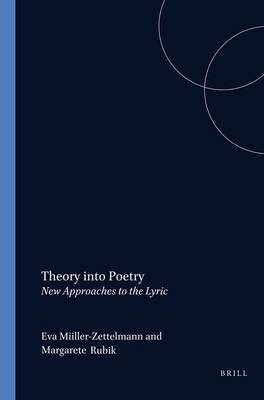
- Afhalen na 1 uur in een winkel met voorraad
- Gratis thuislevering in België vanaf € 30
- Ruim aanbod met 7 miljoen producten
- Afhalen na 1 uur in een winkel met voorraad
- Gratis thuislevering in België vanaf € 30
- Ruim aanbod met 7 miljoen producten
Zoeken
Theory Into Poetry
New Approaches to the Lyric
€ 195,45
+ 195 punten
Omschrijving
At the beginning of the 21st century, there is still no generally accepted comprehensive definition of the lyric or differentiated modern toolkit for its analysis. The reception of poetry is largely characterised either by an empathetic identification of critics with the lyric persona or by exclusive interest in formal patterning.
The present volume seeks to remedy this deficit. All the contributors 'theorise' the lyric to overcome the impasse of an impressionistic and narrowly formalistic critical debate on the genre. Their papers focus on a variety of different questions: the problem of establishing a framework for definition and classification; the search for dynamic and potent critical approaches; investigations of poetry's cultural performance and its fundamental relevance for the construction of group cohesion.
The essays collected in this volume offer a consciously polyphonic range of theories and interpretations, suggesting to the reader a variety of theoretical frameworks and practical illustrations of how a discussion of poetry may be firmly grounded in modern literary theory.
The present volume seeks to remedy this deficit. All the contributors 'theorise' the lyric to overcome the impasse of an impressionistic and narrowly formalistic critical debate on the genre. Their papers focus on a variety of different questions: the problem of establishing a framework for definition and classification; the search for dynamic and potent critical approaches; investigations of poetry's cultural performance and its fundamental relevance for the construction of group cohesion.
The essays collected in this volume offer a consciously polyphonic range of theories and interpretations, suggesting to the reader a variety of theoretical frameworks and practical illustrations of how a discussion of poetry may be firmly grounded in modern literary theory.
Specificaties
Betrokkenen
- Uitgeverij:
Inhoud
- Aantal bladzijden:
- 376
- Taal:
- Engels
- Reeks:
- Reeksnummer:
- nr. 89
Eigenschappen
- Productcode (EAN):
- 9789042019065
- Verschijningsdatum:
- 1/01/2005
- Uitvoering:
- Paperback
- Formaat:
- Trade paperback (VS)
- Afmetingen:
- 170 mm x 240 mm
- Gewicht:
- 784 g

Alleen bij Standaard Boekhandel
+ 195 punten op je klantenkaart van Standaard Boekhandel
Beoordelingen
We publiceren alleen reviews die voldoen aan de voorwaarden voor reviews. Bekijk onze voorwaarden voor reviews.







